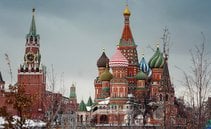Businesses from Russia and Kazakhstan are collaborating on 135 projects worth $26.5 billion, with a further 67 projects under development, worth $14 billion.

In an era characterized by growing economic instability and geopolitical tensions, the fertilizer sector finds itself at the center of significant global issues. On the one hand, European farmers are protesting against rising fertilizer costs, a phenomenon amplified by international sanctions that have affected global trade. On the other hand, we see significant strategic movements in terms of production and international investments that promise to reshape the landscape of the global fertilizer market.
Russia, one of the world’s largest fertilizer producers, has responded to international sanctions by directing its exports to new markets such as Malaysia. This move was highlighted by Dmitry Vakhrukov, Deputy Minister of Economic Development of the Russian Federation, during the XV International Economic Forum "Russia – Islamic World: KazanForum". The sanctions have pushed the country to look for alternatives to maintain its presence in the global market, changing trade routes and strategic plans.
At the same time, we see a major development in Australia, where Abu Dhabi-based Mubadala has initiated a colossal $4.2 billion investment to create an industrial cluster specializing in urea production in Western Australia. This project not only targets an annual production of 2.3 million tonnes of urea but also promotes the adoption of green technologies, including solar energy and green hydrogen, to minimize environmental impact.
In Kazakhstan, a joint venture between Russian and Chinese companies has begun construction of a chemical complex in Zhanatas, a $1 billion project, this plant will not only strengthen regional food security but is also expected to create 2,400 jobs and increase the production of mineral fertilizers, essential for local agriculture.
Businesses from Russia and Kazakhstan are collaborating on 135 projects worth $26.5 billion, with a further 67 projects under development, worth an additional $14 billion.
A few key countries and large conglomerates control the global fertilizer market. Russia and Belarus are leaders in the production of potassium and nitrogen. Canada is a giant in potash production, while China dominates phosphate and nitrogen production. The United States, with companies like CF Industries and Mosaic Company, is critical for phosphate and nitrogen production.
Among the companies, Yara International (Norway), Nutrien (Canada), and EuroChem (Russia) are some of the multinationals that hold a significant share of the market, influencing not only prices but also global agricultural policies.
The challenges facing the fertilizer sector include not only price volatility and access to raw materials but also the urgency to adopt sustainable practices. Growing concern about the environmental impact of fertilizer production is pushing companies to innovate and seek eco-friendly solutions.
The fertilizer sector is more than ever a field of vital economic, environmental, and political intersections. Technological innovation and international cooperation are essential to ensuring a sustainable and productive future for global agriculture. With significant projects underway in Australia and Kazakhstan, and Russia’s strategic adaptation to international sanctions, the global fertilizer market continues to evolve, promising to profoundly impact food security and the global economy in the coming years.
Original article published on Money.it Italy 2024-06-05 06:41:00. Original title: Ecco chi controlla il ricco business dei fertilizzanti





